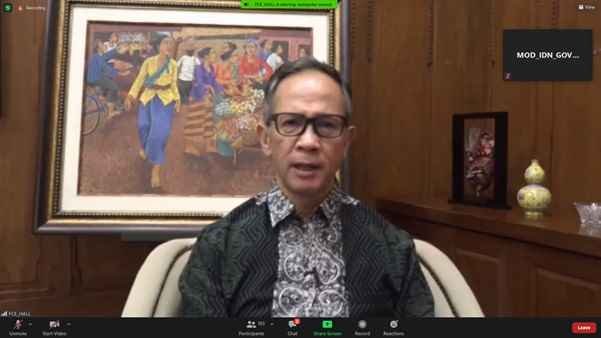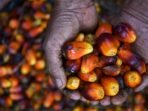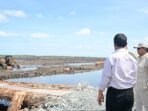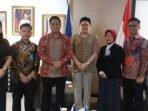Jakarta – Indonesia must take the lead in pushing forward effective implementation of the International Year of Creative Economy for Sustainable Development 2021, that is crucial for the creative economy to build back better from the impacts of the pandemic, as well as to contribute to global economic recovery. That was the key message conveyed by Vice Foreign Minister Mahendra Siregar and Vice Minister for Tourism and Creative Economy Angela H. Tanoesoedibjo, in the joint opening statement of the Friends of Creative Economy (FCE) Meeting 2020.
The International Year of Creative Economy for Sustainable Development 2021 was decided by the United Nations through the UN General Assembly Resolution No, 74/198 that was initiated by Indonesia. This is one of many examples of Indonesia’s international leadership in advancing the creative economy agenda in the international community.
The FCE was held on 11-12 November 2020 upon the initiative of the Indonesia Ministry of Tourism and Creative Economy and the Indonesian Ministry of Foreign Affairs. The meeting was held in a hybrid format, with limited physical meeting in Serpong, Indonesia, combined with virtual participation. Participants came with various backgrounds including creative economy actors, government, international organizations (UNESCO and UNCTAD), and academics, that represent 55 countries and 8 international organizations, UN and ASEAN. All have the same passion for restoring the global economy through the creative economy sector.
The focus of the meeting was preparation for the implementation of the International Year. Recognizing the potential of the creative economy for global recovery, Indonesia has proposed the theme of “Inclusively Creative: A Global Recovery” for this implementation. Indonesia is also planning to host a global conference in this sector, namely the World Conference on Creative Economy (WCCE), in Bali, Indonesia, mid 2021.
“Inclusively creative derives from our belief that by providing equal opportunity for everyone regardless of age, gender, background, and geographic location, creative economy will bridge cohesiveness across societies,” underlined by the Vice Minister for Tourism and Creative Economy Angela H. Tanoesoedibjo in the opening of the meeting. “The pandemic has accelerating digital disruption, and today more than ever, we need to address challenges and opportunities of the digitalization and how it affects the creative economy as a whole ” added the Vice Minister for Tourism and Creative Economy.
The Indonesian Vice Foreign Minister Mahendra Siregar emphasized the importance of turning challenges into opportunities by connecting the creative sector, increasing creative industry access to financial inclusion, and the need to strengthen international collaboration. The Indonesian Vice Foreign Minister also said that the implementation of the International Creative Economy Year must be inclusive and action-oriented.
FCE identified 4 important parameters to implement the FCE, namely, “Inclusive, innovative, meaningful and impactful”, as summarized by the Director General of Multilateral Cooperation, Febrian Ruddyard. These four keys are important to ensure that the implementation of the International Year can have a real contribution in reviving the creative sector towards resilience, robust, and contribute to global recovery.
“Let’s keep this positive momentum, strengthen the spirit to think creatively and collaborate inclusively, so that we can continue to make progress that benefits all stakeholders of the creative economy,” he concluded.
The FCE 2020 meeting has also succeeded in identifying a number of international programs and initiatives to carry out the international year in achieving the Sustainable Development Goals (SDGs).
Anang Fadhilah











